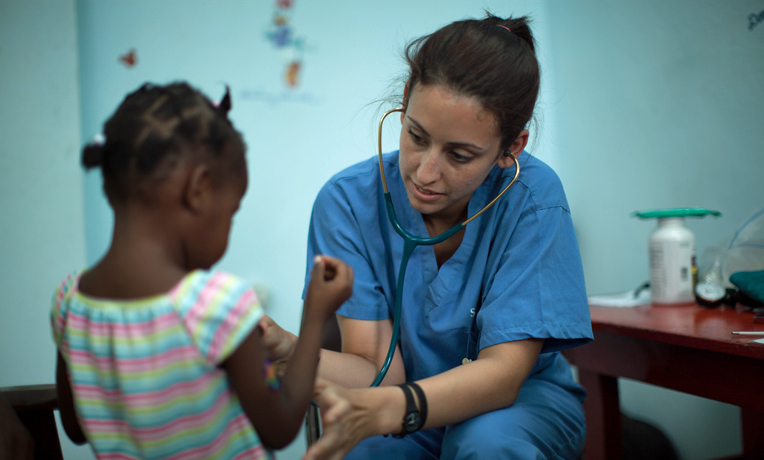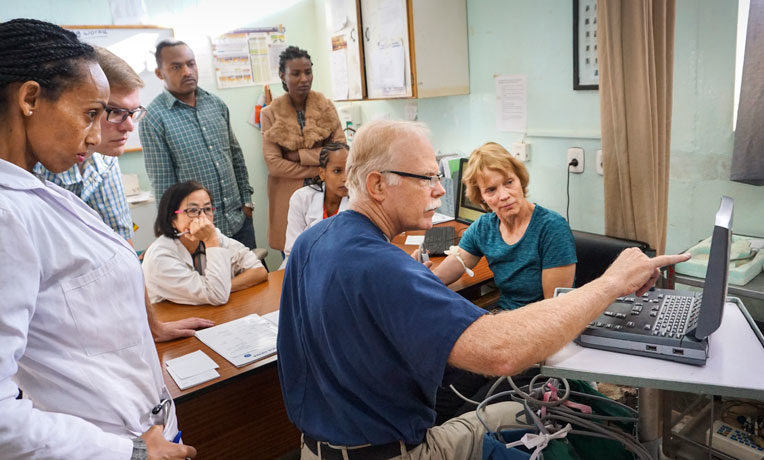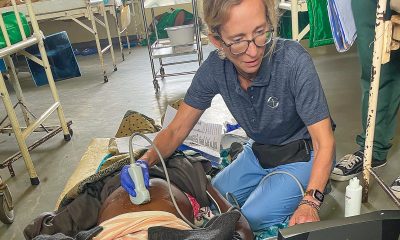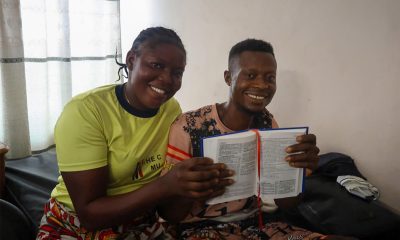A California couple takes a break from their busy careers to experience ministry and fellowship on a whole new level.
As first-time volunteers with World Medical Mission, Drs. Mark and Melisa Agness didn’t have any lofty goals when they arrived at Soddo Christian Hospital in Ethiopia last fall. They simply wanted to minister to patients and staff and make whatever difference they could.
Not only did the experience exceed their expectations, but the California couple looks forward to doing more short-term missions work.
They had considered medical missions for years but were busy with their careers—Mark as an emergency medicine physician at a large hospital and Melisa as a diagnostic radiologist who operates her own imaging center and teaches community health. The couple also have two sons, now in their 20s.
“We prayed about it and decided now is the time,” said Melisa. “Then we started looking for a hospital that needed our specialties.”
Trusting the Lord
Soddo Hospital, a 140-bed facility in southwestern Ethiopia, was the answer to those prayers. Mark had some experience serving with church planting/mobile medical care teams working in Kenya, Mexico, and Bulgaria. Melisa had never gone on an overseas medical mission trip.
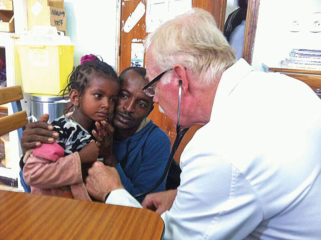
Mark cares for a patient at Soddo Hospital.
“We wanted to make sure we were going to Ethiopia for the right reasons, with the right motivation,” Mark explained. “We didn’t want to go for adventure or for medical tourism. We just wanted to be faithful in serving God and encouraging the full-time staff that work so hard in the midst of difficult circumstances.”
There were a few snags, principally the delay that turned into an 18-month wait to receive medical licensing approval from the Ethiopian government.
With Melisa planning to join him two weeks later, Mark traveled alone to Ethiopia Oct. 23 with arrangements for someone from Soddo to pick him up at the airport. He arrived on schedule, but due to a mix-up no one was there to meet him.
Some anxious moments ensued, but Soddo staff helped him find a ride with a cabdriver who spoke English and who transported him 75 miles to the hospital.
“Everyone at Soddo was very welcoming. They broke me in gently to make the transition from working in a Western hospital to a hospital in the developing world,” he said. “The tremendous medical and spiritual needs of the people were eye-opening. It’s all abstract until you are actually here and you see the immensity of the needs.”
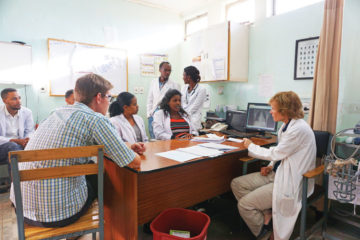
Melisa consults with members of the hospital medical team.
He experienced those harsh realities very quickly—sick people who came to the hospital, sometimes walking for miles, and then waiting all day in a long line to see a doctor. Medications and equipment were limited, necessitating that the staff devise new strategies of care based on available resources.
In one instance, they were treating a young man whose lungs were filled with fluid due to rheumatic heart disease. Unlike what Mark is accustomed to in the United States, there was no cardiac surgeon to consult at the hospital and no blood chemistry analyzer.
And liquid oxygen is hard to come by outside of Ethiopia’s capital city. Their only recourse was to give the man “as good a quality of life as possible,” he said.
What impressed him, however, was how much the hospital staff relied on God’s providence and provision each day and the strong spiritual focus that was integrated into patient care. He found it refreshing to see chaplains accompany doctors on their rounds, praying with patients, and sharing the eternal hope of Jesus Christ.
During one of the weekly chapel services, Mark and Melisa were moved by the testimony of a former patient at Soddo who had committed his life to Christ and started a church in his community. Although Melisa was unfamiliar with the Amharic language, she rejoiced to see God glorified through the powerful message and music.
“It was the first time for me to experience the worship of God in a language and culture that is different from my own,” she said. “I didn’t know the language, but my heart joined with them. God is everywhere in the world, and He is worshiped in every tongue and nation.”
“God is everywhere in the world, and He is worshiped in every tongue and nation.”
Melisa’s own faith grew as she turned to the Lord for insight during critical moments of decision. One of those answers came on a Saturday night as she was summoned to the hospital to perform an ultrasound on the abdomen of a baby. Pediatrics imaging was something she hadn’t done since residency.
“I said, ‘Lord, I need your help.’ I had to determine if the child needed surgery.” Based on the scan results, Melisa recommended an operation. “The doctor did the surgery that night and probably saved the child’s life,” she said. “I had three more cases like that at Soddo.”
Learning from One Another
Mark and Melisa relished the opportunity to work together, something they had not been able to do in their professional careers for many years. Melisa took radiology scans and the next day they would review the images with staff.
Mark also enjoyed teaching some of the doctors and medical residents, an unexpected blessing that he found both fulfilling and fun.
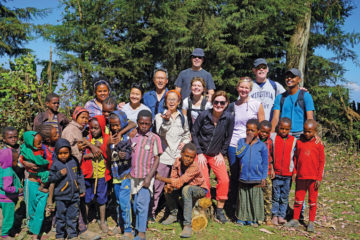
Mark and Melisa enjoy a day off with Soddo families.
“I planned to do direct patient care, but my role quickly changed to supervising, mentorship, and teaching. I was able to develop great relationships with the Ethiopian doctors,” he said.
“Similarly, they were open and willing to share their expertise with me as I navigated the nuances of a new system and encountered a mixture of illnesses not usually seen in the West. I came away with a new appreciation for the challenges and opportunities for medical care in Ethiopia.”
A highlight of their five-week trip was the medical outreach to a rural community called Ajora. Half of the adventure was the two-hour drive from Soddo on dirt roads where their team had to dodge deep ruts and wandering cattle.
The villagers had essentially no access to medical care and suffered from a variety of chronic illnesses, infectious diseases, skin ailments, and malaria. As part of their outreach, Mark and a nursing student set up a gynecology clinic that enabled them to identify several women who are candidates for surgery. The hospital will cover the costs for the procedures through its benevolence fund.
After long days at the hospital, the Agnesses appreciated the hospitality and friendship that was lavished on them by the missionary doctors and their families. Melisa was touched when one family invited them over for a dinner that included chicken as the main course—a special treat since poultry is not readily available. And most memorable was the exhilarating group hike up Mount Dhamota with the sweeping view of the Great Rift Valley.
The couple plans to make a return trip to Ethiopia, as well as venture out to more locations with World Medical Mission. Their only regret is that they didn’t serve sooner.
“If we could do it over again, we would have taken time off from our careers and brought our boys on mission trips with us,” Melisa said. “The field is open for anyone who has a heart for missions. What you think are obstacles really aren’t. You have to be intentional and make it happen.”
